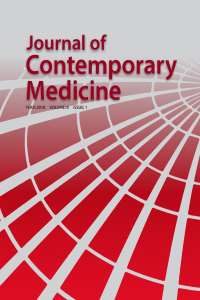Werner Sendromlu bir olguda sıradışı organ tutulumu: tiroid atrofisi
atrofi; tiroid; Werner Sendromu
An unusual organ involvement in a case of Werner Syndrome: thyroid atrophy
atrophy; thyroid; Werner syndrome,
___
- Goto M. Werner's syndrome: from clinics to genetics. Clin Exp Rheumatol 2000;18(6):760-6.
- Goto M, Horiuchi Y, Tanimoto K, Ishii T, Nakashima H. Werner's syndrome: analysis of 15 cases with a review of the Japanese literature. J Am Geriatrics Soc 1978;26(8):341–7.
- Ostler EL, Wallis CV, Sheerin AN, Faragher RG. A model for the phenotypic presentation of Werner's syndrome. Exp Gerontol 2002;37(2-3):285-92.
- Ergün MA. [Replicative Ageing, Cellular Ageing and Apoptosis: Outcomes and Importance in Diseases]. Turkiye Klinikleri J Med Sci 2008;28(6 Suppl 1):S 21-6
- Martin GM, Sprauge CA, Epstein CJ. Replicative life-span of cultivated human cells. Effects of donor’s age, tissue, and genotype. Lab Invest 1970;23(1):86–92.
- Topaloğlu O, Çakır B, Aydın C, Ağaç T, Özkaba A. [Werner's Syndrome Presenting Without Hypogonadism: Differential Diagnosis]. Turkiye Klinikleri J Med Sci 2006;26(6):711-5.
- Zantour B, Messaoud R, Zouali M, Ladjimi A, Braham H, Hamza H, et al. Werner's syndrome and endocrine disorders. Ann Endocrinol 2003;64(3):205-9.
- Ishii T, Hosoda Y. Werner's syndrome: autopsy report of one case, with a review of pathologic findings reported in the literature. J Am Geriatr Soc 1975;23(4):145-54.
- Tokunaga M, Mori S, Sato K, Nakamura K, Wakamatsu E. Postmortem study of a case of Werner's syndrome. J Am Geriatr Soc 1976;24(9):407-11.
- Imura H, Nakao Y, Kuzuya H, Okamoto M, Okamoto M, Yamada K. Clinical, endocrine and metabolic aspects of the Werner syndrome compared with those of normal aging. Adv Exp Med Biol 1985;190:171-85.
- Ishikawa Y, Sugano H, Matsumoto T, Furuichi Y, Miller RW, Goto M. Unusual features of thyroid carcinomas in Japanese patients with Werner syndrome and possible genotype-phenotype relations to cell type and race. Cancer 1999;85(6):1345-52.
- Yayın Aralığı: Yılda 6 Sayı
- Başlangıç: 2011
- Yayıncı: Rabia YILMAZ
Berat ACU, Taylan KARA, Safiye TOPALOGLU ASCI, Murat BEYHAN
Radiologic findings of intrapancreatic accessory spleen
Berat ACU, Taylan KARA, Safiye TOPALOGLU ASCI, Murat BEYHAN
Mustafa KAYA, Osman YAVUZ, Şaziye ŞANVERDİ TOPALOĞLU, Fatih ÇANKAL, Ali KÖKSAL
Acil Servise İntihar Girişimi Nedeniyle Başvuran Olguların İncelenmesi
Hamit KETEN, Hakan HAKKOYMAZ, Ümit ASLAN, Şeyma BAHAR, Alper KETEN, Mustafa SUCAKLI, Selim BOZKURT
Faktör V Leiden ve Mthfr İkili Mutasyonu Bulunan Renal Ven Trombozlu Yenidoğan Olgusu
Hakan ALTIN, Şenol ÇİTLİ, Ahmet AKÇAY
Çocuklarda Hemoroidler: Bir Retrospektif Çalışma
Afra KARAVELİOĞLU, Atilla SENAYLİ, Burhan KÖSEOĞLU, Melih AKIN, İsmet ÖZGÜNER
Simulasyon: Brifing Öncesi Hazırlık, Klinik Yargı ve Yansıma. İlişki Nedir?
İnce Barsak Obstrüksiyonunda Strangülasyon-İnkarserasyon Ayrımı: Klinik ve Laboratuar Bulgular
Okan AKTÜRK, Yeliz AKTÜRK, Erdinç ÇETİNKAYA
Jejunal İnvajinasyonu Taklit eden Askariazis
Tamer SEKMENLİ, İlhan CİFTCİ, Halil EMİROGLU, Mustafa KOPLAY
MONOSEMPTOMATİK ENUREZİSLİ ÇOCUKLARDA VE ANNELERİNDE YAŞAM KALİTESİNİN DEĞERLENDİRİLMESİ
Orhan KARA, Kadriye ÖZDEMİR, Nida DİNÇEL, Ayse KUTLU, Ebru YILMAZ, Gülsüm CANTÜRK, Sevgi MİR
